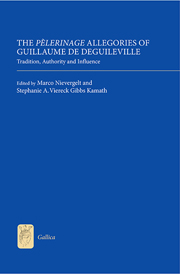Book contents
- Frontmatter
- Contents
- List of Illustrations
- List of Contributors
- Acknowledgements
- Abbreviations
- Introduction
- Part I Tradition
- Part II Authority
- Part III Influence
- 7 Remembered Pèlerinage: Deguileville's Pilgrim in Philippe de Mézières's Songe du Vieil Pelerin
- 8 La réception espagnole de Deguileville: El Pelegrino de la vida humana
- 9 Body Trouble: The impact of Deguileville's Allegory of Human Life on Croatian Renaissance Literature
- Bibliography
- Index
9 - Body Trouble: The impact of Deguileville's Allegory of Human Life on Croatian Renaissance Literature
from Part III - Influence
Published online by Cambridge University Press: 05 December 2013
- Frontmatter
- Contents
- List of Illustrations
- List of Contributors
- Acknowledgements
- Abbreviations
- Introduction
- Part I Tradition
- Part II Authority
- Part III Influence
- 7 Remembered Pèlerinage: Deguileville's Pilgrim in Philippe de Mézières's Songe du Vieil Pelerin
- 8 La réception espagnole de Deguileville: El Pelegrino de la vida humana
- 9 Body Trouble: The impact of Deguileville's Allegory of Human Life on Croatian Renaissance Literature
- Bibliography
- Index
Summary
This essay discusses how Croatian Renaissance literature reflects the influence of Deguileville's allegory of human life as a pilgrimage, looking in particular for possible borrowings from PVH. uncovering intertextual relations, this study also sheds light on how medieval poetic paradigms permeated Renaissance literature, bringing into focus dynamic continuities amid the shifting historical, cultural and linguistic contexts of Europe in this era. Croatia's position – suspended between Byzantine (Greek) and western (Latin) influence – invites us to look beyond traditional geographic boundaries as well as across the conceptual division of the ‘Middle Ages’ from the ‘Renaissance’. The openness of this literature to different forms of cultural translation is further enhanced by the linguistic complexities of late medieval Croatian culture, which is both trilingual (Latin, Croatian and Old Slavic languages) and triliterate (relying on Glagolitic, Cyrilic and Roman script).
Croatia's geographical position at the crossroads of Central Europe and the Mediterranean determined its role as an intermediary between the two large cultural arenas. During the fourteenth century, Croatian literature became increasingly receptive to the influence of western literature; in the fifteenth century, this influence became dominant, significantly contributing to the development of Croatian Renaissance culture. The fourteenth century – often considered the golden age of Croatian political history and court culture – witnessed the ascent of the French Angevin dynasty, the Capetian House of Anjou, to the Croatian-Hungarian throne (1301–1409).
- Type
- Chapter
- Information
- The Pèlerinage Allegories of Guillaume de DeguilevilleTradition, Authority and Influence, pp. 189 - 208Publisher: Boydell & BrewerPrint publication year: 2013



